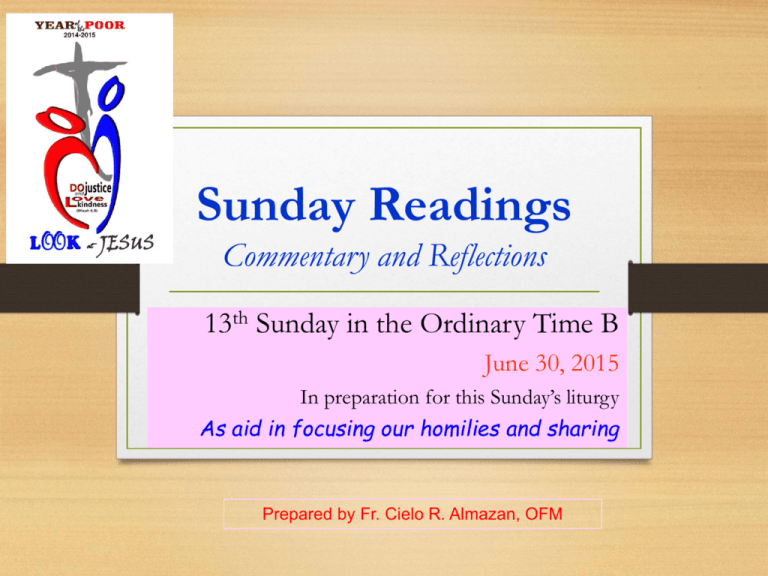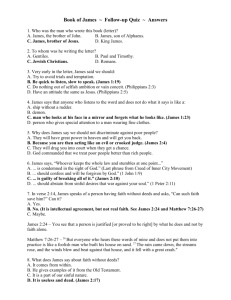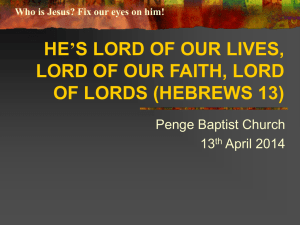Commentary
advertisement

Sunday Readings Commentary and Reflections 13th Sunday in the Ordinary Time B June 30, 2015 In preparation for this Sunday’s liturgy As aid in focusing our homilies and sharing Prepared by Fr. Cielo R. Almazan, OFM 1st reading: Wisdom 1,13-15; 2,23-24 • 1,13 God did not make death, nor does he rejoice in the destruction of the living. 14 For he fashioned all things that they might have being; and the creatures of the world are wholesome, And there is not a destructive drug among them nor any domain of the nether world on earth, 15 For justice is undying. • 2,23 For God formed man to be imperishable; the image of his own nature he made him. 24 But by the envy of the devil, death entered the world, and they who are in his possession experience it. The focus is God’s positive will. 1st reading: Wisdom 1,13-15; 2,23-24 • 1,13 God did not make death, nor does he rejoice in the destruction of the living. 14 For he fashioned all things that they might have being; and the creatures of the world are wholesome, And there is not a destructive drug among them nor any domain of the nether world on earth, 15 For justice is undying. Commentary: The reading belongs to the 1st part of the book of Wisdom called “The Praises of Wisdom” (1,1—11,1) • 1,13 states that death and destruction of the living are not God’s will. • V.14 affirms God’s loving plan. God has skillfully made us. We are not flawed creatures. • V.14b says there is no built-in evil (destructive drug/element) in us. • This is how God shows his justice. V.15 1st reading: Wisdom 1,13-15; 2,23-24 • 2,23 For God formed man to be imperishable; the image of his own nature he made him. 24 But by the envy of the devil, death entered the world, and they who are in his possession experience it. • 2,23 affirms God’s plan of creation in Genesis. • Human beings are made in God’s image. • V.24 states that through the devil, death came to the world and to those who are possessed by it. Reflections on the 1st reading • God is a good god, not an evil god. (a contradiction in terms) • God is a good designer. God does not create anything • • • • • • evil. Human beings are destined for life, not death. Evil is the negation of God’s will. We cannot attribute evil to God. Evil is also mysterious. We cannot fully explain what it is all about, or, where it comes from. But in our experience, when we allow evil to come into our hearts, there is destruction; there is chaos and death. Therefore, we should never give evil a chance. Responsorial Ps 30:2, 4, 5-6, 11, 12, 13 • R. (2a) I will praise you, Lord, for you have rescued me. • 2 I will extol you, O LORD, for you drew me clear and did not let my enemies rejoice over me. 4 O LORD, you brought me up from the netherworld; you preserved me from among those going down into the pit. • 5 Sing praise to the LORD, you his faithful ones, and give thanks to his holy name. 6 For his anger lasts but a moment; a lifetime, his good will. 11 At nightfall, weeping enters in, but with the dawn, rejoicing. • 12 Hear, O LORD, and have pity on me; O LORD, be my helper. 13 You changed my mourning into dancing; O LORD, my God, forever will I give you thanks. Responsorial Ps 30:2, 4, 5-6, 11, 12, 13 • R. (2a) I will praise you, Lord, for you have rescued me. • 2 I will extol you, O LORD, for you drew me clear and did not let my enemies rejoice over me. 4 O LORD, you brought me up from the netherworld; you preserved me from among those going down into the pit. • 5 Sing praise to the LORD, you his faithful ones, and give thanks to his holy name. 6 For his anger lasts but a moment; a lifetime, his good will. 11 At nightfall, weeping enters in, but with the dawn, rejoicing. • 12 Hear, O LORD, and have pity on me; O LORD, be my helper. 13 You changed my mourning into dancing; O LORD, my God, forever will I give you thanks. Commentary • The responsorial psalm, classified as thanksgiving hymn, aptly expresses the feeling of a person who has been in danger, but has been saved by God. • In v.2, the psalmist rejoices because God did not allow his enemies to taunt him. • In v.4, the psalmist describes how God has saved him. • The netherworld and the pit are one and the same. To go into this place is to be buried. Responsorial Ps 30:2, 4, 5-6, 11, 12, 13 • R. (2a) I will praise you, Lord, for you have rescued me. • 2 I will extol you, O LORD, for you drew me clear and did not let my enemies rejoice over me. 4 O LORD, you brought me up from the netherworld; you preserved me from among those going down into the pit. • 5 Sing praise to the LORD, you his faithful ones, and give thanks to his holy name. 6 For his anger lasts but a moment; a lifetime, his good will. 11 At nightfall, weeping enters in, but with the dawn, rejoicing. • 12 Hear, O LORD, and have pity on me; O LORD, be my helper. 13 You changed my mourning into dancing; O LORD, my God, forever will I give you thanks. • In v.5, the psalmist exhorts the listeners • • • • • to give praise (= thanks) to God. In v.6, the psalmist interprets his near death (or victory of his enemies) as punishment for his sins. The psalmist is happy that God’s anger over him is only for a moment, not for a lifetime. V.11 is a poetic expression of his experience. V.12 changes the mood of the psalm, as if the psalmist is in trouble again. It should be like v.2a. V.13 keeps the feeling of thanksgiving on tract. Reflection on the Psalm • Like the psalmist, we encounter a lot of dangers (brush with death). • We have enemies (those who want to destroy/discredit us). • Like the psalmist, we too should rejoice and encourage others to celebrate because God has prevailed over them. • Let us give thanks to God for having preserved us from destruction and death. • We, as survivors, are enjoined to celebrate life. 2nd reading: 2 Cor 8,7.9.13-15 • 7 As you excel in every respect, in faith, discourse, knowledge, all earnestness, and in the love we have for you, may you excel in this gracious act also. • 9 For you know the gracious act of our Lord Jesus Christ, that for your sake he became poor although he was rich, so that by his poverty you might become rich. 13 Not that others should have relief while you are burdened, but that as a matter of equality 14 your surplus at the present time should supply their needs, so that their surplus may also supply your needs, that there may be equality. 15 As it is written: "Whoever had much did not have more, and whoever had little did not have less." The focus is to excel in faith, charity and justice. 2nd reading: 2 Cor 8,7.9.13-15 • 7 As you excel in every respect, in faith, discourse, knowledge, all earnestness, and in the love we have for you, may you excel in this gracious act also. • 9 For you know the gracious act of our Lord Jesus Christ, that for your sake he became poor although he was rich, so that by his poverty you might become rich. 13 Not that others should have relief while you are burdened, but that as a matter of equality 14 your surplus at the present time should supply their needs, so that their surplus may also supply your needs, that there may be equality. 15 As it is written: "Whoever had much did not have more, and whoever had little did not have less." Commentary: • The passage is an appeal to excel (to do one’s best) in doing good (justice and charity). V.7 • V.9 talks of Christ’s kenosis (emptying). Christ becomes poor to make us rich. • Vv.13-14 clarify that self-emptying results to equality, not empoverishment. • Equality comes as a result of sharing. • V.15 is a wisdom saying. This verse is a good representative of the Church of the Poor that believes that “no one should be too poor that he has nothing to give; no one should be too rich that he should not receive anything.” Reflections on the 2nd reading • As we excel in faith, we must also excel in its expression, that is, justice and charity. • Excelling in charity and justice is patterned after that of Christ who became poor to make us rich. • We can practice charity by getting rid of our surplus (excess). • There should be no worry about parting away with surplus. It does not make our lives miserable. • In fact, it makes us equal, meaning, no one suffers from want when everyone is charitable and just. • When we excel in faith and in charity and justice, we build a just society, a just community, a just Church. Gospel: Mk 5, 21-24.35-43 Setting: • 21 When Jesus had crossed again (in the boat) to the other side, a large crowd gathered around him (because they wanted to listen to him, they believed in his words), and he stayed close to the sea (to have a space, to maintain a distance for better communications). Intercession • 22 One of the synagogue officials, named Jairus, came forward. Seeing him he fell at his feet 23 and pleaded earnestly with him (a gesture of intense prayer and belief, and love for his daughter), saying, "My daughter is at the point of death. Please, come lay your hands on her that she may get well and live." (Jairus, a Jew and a practitioner of Judaism, believes in the power of Jesus. He did not care what his fellow Jews would say. According to our modern standards, the daughter should be brought to the hospital. Here the request to lay his hands is expressive of Jairus’ faith.) Jesus’ positive response • 24 He went off with him (without question), and a large crowd followed him and pressed upon him (The imagery of v.21 comes back: large crowd and space). The focus is the faith in the power of Jesus. Intermission • 35 While he was still speaking, people from the synagogue official's house arrived and said, "Your daughter has died; why trouble the teacher any longer?" (A concern of the official’s personnel on Jesus. Meaning, don’t waste his time anymore. Jairus is silent. It is possible that he agrees with them, but he journeys with Jesus home.) 36 Disregarding the message that was reported (Jesus is taking charge. He is confident of what is going to do, he will do more, more than healing a sick, but now raising a dead), Jesus said to the synagogue official, "Do not be afraid; just have faith." 37 He did not allow anyone to accompany him inside except Peter, James, and John, the brother of James (no more crowd, who might become osiosero, but only 3 apostles). Setting in the house • 38 When they arrived at the house of the synagogue official, he caught sight of a commotion, people weeping and wailing loudly. 39 So he went in and said to them, "Why this commotion and weeping? The child is not dead but asleep." 40 And they ridiculed him (Maybe they don’t know who he is). Need for Privacy • Then he put them all (Jesus is taking charge again. He wants peace and quiet, to perform a miracle). He took along the child's father and mother (only now the mother is mentioned) and those who were with him and entered the room where the child was. The miracle • 41 He took the child by the hand and said to her, "Talitha koum," (Aramaic) which means, "Little girl, I say to you, arise!" • 42 The girl, a child of twelve, arose immediately and walked around. (At that) they were utterly astounded. (the reaction) The command • 43 He gave strict orders that no one should know this (part of his messianic secret?) and said that she should be given something to eat. Commentary / Observations • The synagogue leader is not just an ordinary person. He • • • • occupies a special place in the Jewish community. He used his training in the synagogue to plead with Jesus (his gesture of prayer). He is not ashamed to show to his fellow Jews (the crowds) his faith in Jesus. He takes a risk. He follows through when Jesus takes action. He journeys with Jesus to his house. He is passive when informed about the death of his daughter. He does not cry, he is still hopeful. Her death should have discouraged them, yet, they still proceed. • Jesus is the protagonist of the story. He reads the sincerity of Jairus; assures him that something good will happen, and goes with him to his house. • The narrator invites the listeners also to follow through and see what will happen. • True enough. It is worth following through. • Jairus’ prayer is answered. His faith is awarded with his daughter coming back to life. Reflections on the gospel • God can do miracles if we have faith in his power. • Faith is not just an intellectual assent that God is powerful, but an active effort to approach God with feelings and prayer. • Faith is following up with God, journeying with him even if all seem to have been lost. • There is no harm in trying and believing. • God can reverse the fate of the unlucky. • Happy ending awaits those who believe. Tying the 3 readings and the Psalm • God does not will death nor evil to us. (1st reading) • The psalmist celebrates his salvation from death. (Psalm) • God challenges us to excel in our practice of justice and charity, not only in faith. (2nd reading) • God can make the dead rise if we have faith in him. (gospel) In the preaching, we may put the 1st reading and gospel together. And then in the last part, as part of the challenge, we may mention the theme of the 2nd reading. How to develop your homily / sharing • Begin with a desperate view of God: powerless, not listening, has abandoned us, etc. • Our image of God is conditioned by our experiences. • First of all, our image of God must be conditioned by our faith. • We must be informed of who God is really (through the Bible, catechism and sound doctrine). • Challenge the negative view with the message of the 1st and gospel readings: • God is good; he does not will evil and death to us, his creatures. • God can make miracles if we believe in him. • The psalm leads us, who are spared from death, to praise God. • It induces us to unite us, people, for a common purpose • To recognize God’s positive will • The salvation of one can unite us individuals to sing praises to God, in a liturgy. • The liturgy is an orderly celebration of God’s love for all of us. • We must not take the purpose of liturgy for granted. • Based on the second reading, life can be better if we excel not only in faith but also in the practice of charity and justice. • Take note of the word “excel.” • We give quality (high quality / supreme quality) to our faith and practice. • In excelling, we promote equality by throwing away our excesses (surplus). • Those are garbage, but treasure for the poor. • Surplus is anything that is in our possession, in our power, but not needed. • Surplus refers to all belongings that you have not touched for a year (St. Basil). • Let us be reminded of the message of the second reading, picked up by the PCP II on Christian communities. • “There should be no one so poor as to have nothing to give and there should be no one so rich among us as to have nothing to receive.” • It is another way of saying that everyone must exercise justice and charity in our community. • In our church, there should be no place for faith that does not liberate us from inequality. • How does your parish celebrate the Year of the Poor? • By being just and charitable, we can reverse the fate of unlucky individuals, the desperate families, women and children, and our insensitive and soulless political, social and economic systems. • Inability to practice justice and charity promotes the misconception that God is evil. (a contradiction in terms) • It is plain injustice and insult to God, to the Church and to our faith. It is a fake faith. • In the eucharist, God is still excelling in giving us his justice and love, in the forms of bread and wine. • The eucharist is the ever pervading Christian symbol of God’s goodness and good will to us. He assures us of immortality, life eternal. • The eucharist strengthens us in our struggle to make our faith alive by excelling in the practice of justice and peace. • In the eucharist, God is telling us “I am here. Don’t be afraid. Move on.” Our Context of Sin and Grace • • • • • Euthanasia Death Hopelessness Churchy Irrelevant practice of religion: faith without justice and charity • Always looking for signs and miracles • Life-giving forces • Integrated practice of religion: faith, justice and charity • • • • • Red Cross Rescuers Social services Cooperatives JPIC Movements Suggested Songs • Enter Rejoice • Sing a New Song (Entrance) • http://www.youtube.com/watch?v=W2g8K8igzsw • Sharing • http://www.youtube.com/watch?v=q1ij6D6EyeI • You Are So Good (Recessional) • http://www.youtube.com/watch?v=spj_5sTiF5Y • God is good..








